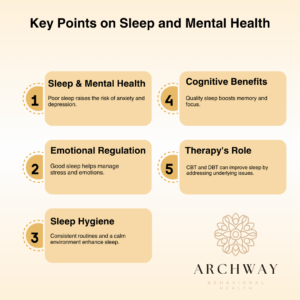In today’s fast-paced world, where work demands, social obligations, and personal commitments often blur into a chaotic routine, the importance of sleep can easily be underestimated. However, sleep is not just a passive activity; it’s an essential component of mental well-being that influences every aspect of our lives. From enhancing emotional resilience to bolstering cognitive function, quality sleep plays a pivotal role in maintaining and improving mental health.
The Connection Between Sleep and Mental Health
Sleep and mental health are intricately linked, with each influencing the other in significant ways. Adequate sleep is essential for maintaining emotional stability and cognitive function.
Research has shown that individuals who regularly experience sleep disturbances are at a higher risk of developing mental health conditions such as depression and anxiety. For example, individuals with insomnia are more likely to experience mood swings, heightened stress levels, and impaired concentration. On the other hand, conditions like depression and anxiety can also interfere with sleep patterns, making it difficult for individuals to achieve restorative sleep.
Sleep and Cognitive Function
Quality sleep is needed for cognitive processes such as memory consolidation, problem-solving, and decision-making. During deep sleep stages, the brain processes and stores information gathered throughout the day, which you need for learning and memory retention. Lack of sufficient sleep impairs cognitive function, leading to difficulties in concentration, decreased productivity, and impaired judgment.
Individuals undergoing cognitive therapies like CBT (Cognitive Behavioral Therapy) or DBT (Dialectical Behavior Therapy) can benefit significantly from good sleep. Therapy often requires active engagement in learning and applying new coping strategies. When sleep is compromised, it becomes challenging to absorb and utilize these techniques effectively, potentially hindering progress.

Emotional Regulation and Sleep
One of the most critical functions of sleep is how it impacts your emotional health. A well-rested individual is better equipped to handle stress, maintain emotional balance, and respond to daily challenges with resilience.
In therapeutic settings, such as individual therapy or group therapy, sleep plays a vital role in the effectiveness of treatment. Therapists often emphasize the importance of sleep hygiene to their clients, recognizing that without adequate rest, individuals may struggle to benefit fully from therapeutic interventions.
How Therapy Addresses Sleep Problems?
For those struggling with sleep-related issues, therapy can provide valuable support and strategies. Individual therapy, for instance, can help address underlying psychological factors contributing to sleep disturbances. Cognitive Behavioral Therapy for Insomnia (CBT-I) is a specialized form of CBT therapy designed to address and resolve issues related to insomnia and other sleep disorders.
Group therapy can also be beneficial, as it offers a supportive environment where individuals can share experiences and coping strategies related to sleep issues. This collective approach can foster a sense of community and provide additional insights into managing sleep disturbances.
Dialectical Behavior Therapy (DBT), which focuses on balancing acceptance and change, can also be helpful for individuals experiencing emotional dysregulation that affects their sleep. By addressing emotional challenges and developing effective coping strategies, DBT can indirectly improve sleep quality.
Conclusion
Sleep is more than a restorative function. It is a cornerstone of mental well-being. Its impact on cognitive function, emotional regulation, and overall mental health cannot be overstated. By prioritizing good sleep hygiene and addressing sleep issues through individual therapy, group therapy, CBT therapy, or DBT therapy, individuals can significantly enhance their mental health and overall quality of life. Embracing healthy sleep practices is an investment in both immediate well-being and long-term mental resilience. So, if you feel like you need to sleep less for the sake of productivity, remind yourself that getting rest is not just an indulgence but a crucial component of your mental health.
FAQs on Importance of Sleep for Mental Well-being
How does sleep affect mood?
Lack of sleep can contribute to feelings of irritability, sadness, and anxiety.
Can poor sleep lead to depression?
While not the sole cause, sleep deprivation can increase the risk of developing depression.
How does sleep impact memory and concentration?
Sleep is crucial for memory consolidation and cognitive function. Lack of sleep can impair focus and concentration.
What are some common sleep disorders?
Common sleep disorders include insomnia, sleep apnea, and restless legs syndrome.
How can I improve my sleep hygiene?
Establishing a consistent sleep schedule, creating a relaxing bedtime routine, and optimizing your sleep environment can help.
When should I seek professional help for sleep problems?
If sleep disturbances significantly impact your daily life or if you suspect an underlying sleep disorder, take the step toward reclaiming your life and health—contact us at (888) 488-4103.


